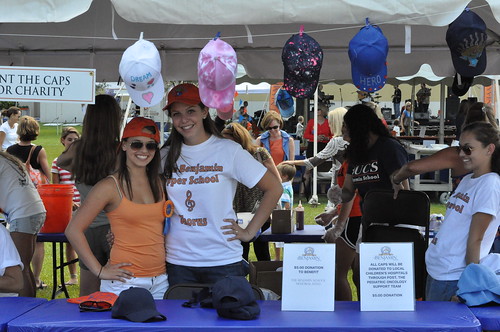I don’t know about you, but a good number of my current communities are one step away from reality — they only exist online. I have a Facebook community, which includes a good number of friends-of-friends that I’ve never met in person. I visit a set list of blogs every day and have a great time interacting with the authors and the other readers. While our definition of community might be expanding, I don’t think any of us have lost sight of the importance of a good, old-fashioned in-person community though.
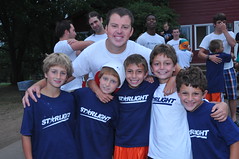 According to the American Camp Association, parents have identified the development of social skills/living in community (such as making new friends, getting along with others, becoming more responsible, and learning group-living skills) as one of the main reasons they send their children to camp. The owners, directors and staff at summer camp all understand the power of community and structure these skills into their programs in several areas.
According to the American Camp Association, parents have identified the development of social skills/living in community (such as making new friends, getting along with others, becoming more responsible, and learning group-living skills) as one of the main reasons they send their children to camp. The owners, directors and staff at summer camp all understand the power of community and structure these skills into their programs in several areas.
1. Communal Living
I am an only child, and as such, I always had my own room when I was a child, so living in a camp bunk for the first time was a huge learning experience. For the first time, I had to be part of a community of people who were sharing space, delegating work and working, communally, to make things work. It didn’t take long for me to get into the routine of doing my part and see how even the most menial job — mine was taking out the trash – contributed to the health of the community.
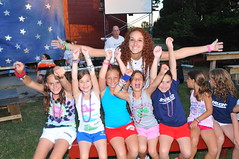 Bunkmates must also learn how to navigate the waters of communal decisionmaking. They must work through the inevitable issues and conflicts that come up in bunk living — and they must learn to adapt and get along when things don’t go their way. They learn to live by the will of the majority, while at the same time respecting the needs of others who represent the minority. Again, according to the ACA, “small group living also provides the necessary intimacy for individuals to achieve a sense of belonging, explore a variety of group roles, cooperate and form relationships with others, and have input into the group’s activities”.
Bunkmates must also learn how to navigate the waters of communal decisionmaking. They must work through the inevitable issues and conflicts that come up in bunk living — and they must learn to adapt and get along when things don’t go their way. They learn to live by the will of the majority, while at the same time respecting the needs of others who represent the minority. Again, according to the ACA, “small group living also provides the necessary intimacy for individuals to achieve a sense of belonging, explore a variety of group roles, cooperate and form relationships with others, and have input into the group’s activities”.
2. Eating and Singing Together
In the past few years there has been a large ad campaign promoting family dinners. Sitting around the dinner table sharing stories, concerns and the high and low points of your day with family members — or fellow campers — creates intimate bonds between all of the participants. Most camps have family-style meals and singing traditional camp songs together is often a ritual. Songs are always a founding piece of any culture and at camp, at the end of session when everyone knows the camp songs, they too become community bonds that live through the years.
3. Connections that Last
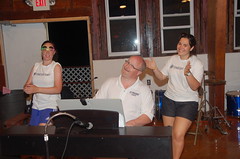 Although sometimes I am annoyed with how much of my life occurs online, there’s no arguing that modern social networking has helped nurture the lifelong friendships developed at camp. Now, instead of waiting days or week from a letter from a camp pen pal, you can send a text message, IM, or just nudge them on Facebook. Many camps have Facebook groups, some devoted exclusively to alumni from certain years, so the 50-somethings reminiscing about camp in the 70s can be a subgroup of a larger online camp community.
Although sometimes I am annoyed with how much of my life occurs online, there’s no arguing that modern social networking has helped nurture the lifelong friendships developed at camp. Now, instead of waiting days or week from a letter from a camp pen pal, you can send a text message, IM, or just nudge them on Facebook. Many camps have Facebook groups, some devoted exclusively to alumni from certain years, so the 50-somethings reminiscing about camp in the 70s can be a subgroup of a larger online camp community.
No matter how much time passes, the camp community lives on. Alumni have frequent get-togethers and are always welcome to spend a day visiting their old camp haunts. Many camps host reunions every year and invite alumni from different generations to come and visit together, creating yet another community, another branch of the family tree.
Want to get and stay connected with Camp Starlight? Check out our Facebook page!
How did you experience community at camp? How have you sustained it since? We’d love to hear your stories in the comments below!
Susan

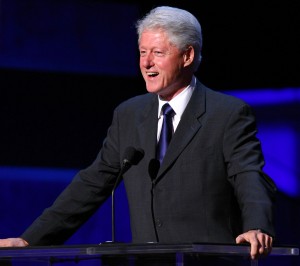 Have you ever thought about what your bunkmates might be doing ten or twenty years down the road? Maybe you have said to one another that you want to come back some day and be counselors, division leaders, and maybe you even dream of being a head counselor. But did you ever consider that the camper in the bunk next to you may end up on the big screen, in the final seconds of the Super Bowl, or even behind a big wooden desk in the White House? Well it may seem crazy to consider now, when you see them all decked out in Starlight gear and occasionally shaking their napkin, but this is the reality of many former campers around the country. It is very surprising to find out how many of the who’s who in American society once found themselves spending their childhood summers in the magical places known as summer camps!
Have you ever thought about what your bunkmates might be doing ten or twenty years down the road? Maybe you have said to one another that you want to come back some day and be counselors, division leaders, and maybe you even dream of being a head counselor. But did you ever consider that the camper in the bunk next to you may end up on the big screen, in the final seconds of the Super Bowl, or even behind a big wooden desk in the White House? Well it may seem crazy to consider now, when you see them all decked out in Starlight gear and occasionally shaking their napkin, but this is the reality of many former campers around the country. It is very surprising to find out how many of the who’s who in American society once found themselves spending their childhood summers in the magical places known as summer camps!
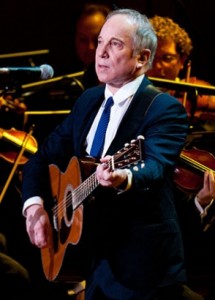 We searched the stacks of Starlight history to find our sole most famous person to walk down camp road. We found most definitely that man is Paul Simon! But what does our future hold? Maybe you will be Camp Starlight’s next claim to fame!
We searched the stacks of Starlight history to find our sole most famous person to walk down camp road. We found most definitely that man is Paul Simon! But what does our future hold? Maybe you will be Camp Starlight’s next claim to fame!


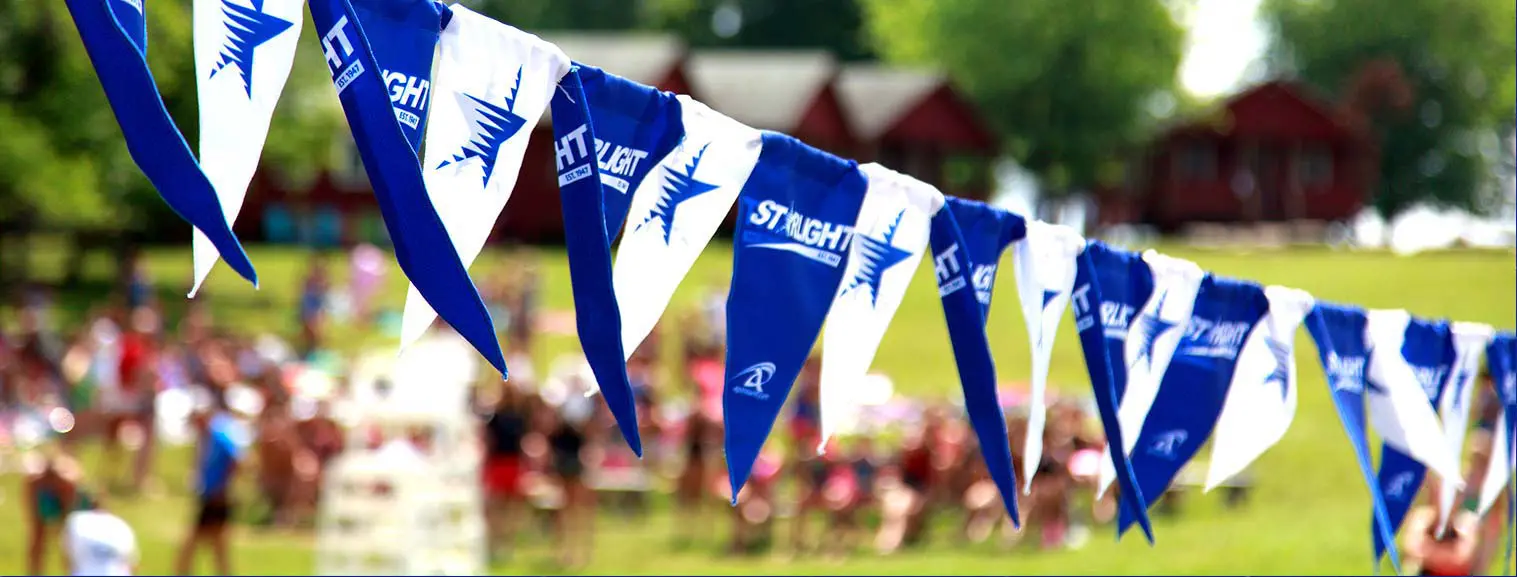
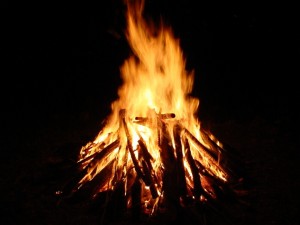
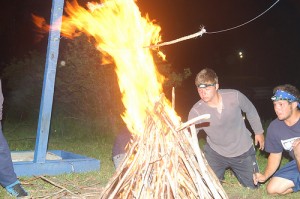
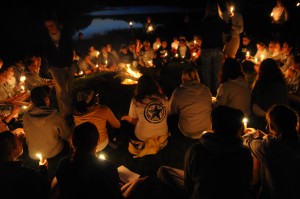
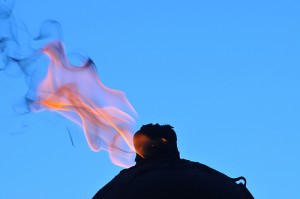
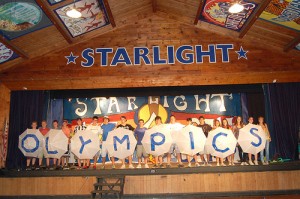
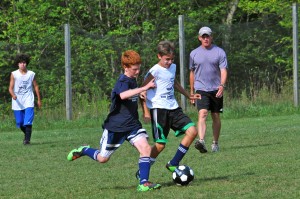
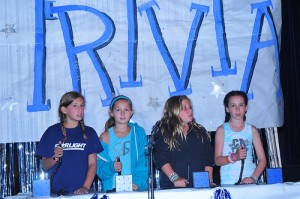
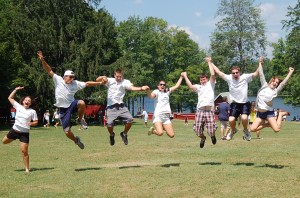
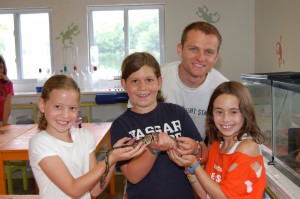
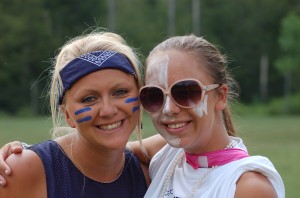
 According to the
According to the  Bunkmates must also learn how to navigate the waters of communal decisionmaking. They must work through the inevitable issues and conflicts that come up in bunk living — and they must learn to adapt and get along when things don’t go their way. They learn to live by the will of the majority, while at the same time respecting the needs of others who represent the minority. Again, according to the ACA, “small group living also provides the necessary intimacy for individuals to achieve a sense of belonging, explore a variety of group roles, cooperate and form relationships with others, and have input into the group’s activities”.
Bunkmates must also learn how to navigate the waters of communal decisionmaking. They must work through the inevitable issues and conflicts that come up in bunk living — and they must learn to adapt and get along when things don’t go their way. They learn to live by the will of the majority, while at the same time respecting the needs of others who represent the minority. Again, according to the ACA, “small group living also provides the necessary intimacy for individuals to achieve a sense of belonging, explore a variety of group roles, cooperate and form relationships with others, and have input into the group’s activities”. Although sometimes I am annoyed with how much of my life occurs online, there’s no arguing that modern social networking has helped nurture the lifelong friendships developed at camp. Now, instead of waiting days or week from a letter from a camp pen pal, you can send a text message, IM, or just nudge them on Facebook. Many camps have Facebook groups, some devoted exclusively to alumni from certain years, so the 50-somethings reminiscing about camp in the 70s can be a subgroup of a larger online camp community.
Although sometimes I am annoyed with how much of my life occurs online, there’s no arguing that modern social networking has helped nurture the lifelong friendships developed at camp. Now, instead of waiting days or week from a letter from a camp pen pal, you can send a text message, IM, or just nudge them on Facebook. Many camps have Facebook groups, some devoted exclusively to alumni from certain years, so the 50-somethings reminiscing about camp in the 70s can be a subgroup of a larger online camp community.
